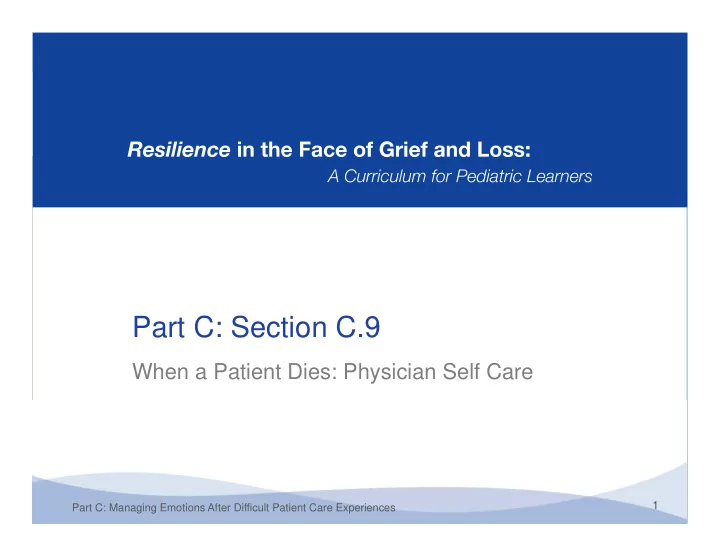

Part C: Section C.9 When a Patient Dies: Physician Self Care 1 Part C: Managing Emotions After Difficult Patient Care Experiences
Objectives o Describe the important steps to take after the death of a child, including o Say good-bye to a patient o Demonstrate good timing of future contact with the family, such as a follow-up meeting o Attend a memorial service and/or sending a note to the grieving family o Initiate self-care 2 Part C: Managing Emotions After Difficult Patient Care Experiences
Milestone Interpersonal and Communication Skills Sub-Competency: Communicate effectively with patients, families, and the public, as appropriate, across a broad range of socioeconomic and cultural backgrounds. American Board of Pediatrics Milestones Project, pp 65-67. 3 Part C: Managing Emotions After Difficult Patient Care Experiences
Goal Progress from using a template or scripts to the ability to develop a trusting relationship with the patient and family and communicate effectively over a wider range of difficult situations. American Board of Pediatrics Milestones Project, pp 65-67. 4 Part C: Managing Emotions After Difficult Patient Care Experiences
Reading: Number One o “I Wish You Knew” o Discuss family’s reactions o Discuss the reaction of someone who was providing care to Ryan A Wills, J Wills, I Wish you Knew, Pediatric Nursing, Sep-Oct 2009, Vol 35, No. 5, p318-321 . 5 Part C: Managing Emotions After Difficult Patient Care Experiences
Reading: Number Two o “The Code” Honor the Child o K Treadway, The Code, NEJM, Sept 27,2007, 357;13, pp 1273-1275 . 6 Part C: Managing Emotions After Difficult Patient Care Experiences
Background When a patient is diagnosed with a terminal illness or approaches death, a physician may remain engaged or may withdraw emotionally. Serwint JR, One Method of Coping: Resident debriefing after the death of a patient, J Peds, Aug, 2004 7 Part C: Managing Emotions After Difficult Patient Care Experiences
Withdrawal vs. Engagement o Withdrawal is a protective mechanism: o Can cause confusion, guilt, sadness, anger, disappointment, abandonment for the patient and family. o Can protect physician from sadness or loss in the short term. BUT o May result in “personal disappointment” and subsequent “burnout”. 8 Part C: Managing Emotions After Difficult Patient Care Experiences
Withdrawal vs. Engagement (continued) o Physician Engagement with the patient and family can: o Result in a true sense of connection, healing, comfort for the family. o Be invaluable experience for the physician. 9 Part C: Managing Emotions After Difficult Patient Care Experiences
When a Child Dies o Inform the parents/family what has occurred in an understandable, sensitive, compassionate manner. o Console; listen to the family members; answer questions. o Be aware of possible support resources for the family. o Be present. J Serwint. “When a child dies”, Contemporary Pediatrics, Vol. 12, No. 3, March 1995. 10 Part C: Managing Emotions After Difficult Patient Care Experiences
When a Child Dies Do Don’t Be available Let your own sense of helplessness keep you from reaching out to bereaved parents Let your genuine concern Avoid them because you are uncomfortable and caring show Say you are sorry Say you know how they feel. Unless you have lost a child yourself, you probably don’t. J Serwint. “When a child dies”, Contemporary Pediatrics, Vol. 12, No. 3, March 1995. 11 Part C: Managing Emotions After Difficult Patient Care Experiences
Dealing with Your Own Feelings o What are appropriate emotions? o How does one balance one's own emotions and maintain one's professionalism? 12 Part C: Managing Emotions After Difficult Patient Care Experiences
Caregiver Emotional Responses o Anger, guilt, fear, powerlessness, personal vulnerability, sorrow, or burnout o Death of a child can be especially difficult. o Some may think that considering one's own emotions might be perceived as weakness. 13 Part C: Managing Emotions After Difficult Patient Care Experiences
Integration of the Experience o Consider attending a memorial service or sending a note of condolence o Attending memorial service: o Demonstrates respect for the patient and family o May strengthen the relationship with the family o Allows physician to see patient and parents in context of family o May help physician integrate experience and offer closure Serwint JR et al, Personal and Professional Experiences of Pediatric Residents Concerning Death, Jour Pall Med, Vol 9, N0 1, 2006 Borasino, S, et al, Physicians’ Contact With Families After Death of Pediatric Patients: A Survey of Critical Care Practitoners’ Beliefs and Self-Reported Practices, Pediatrics, Vol 122, No 6 2008. 14 Part C: Managing Emotions After Difficult Patient Care Experiences
Integration of the Experience (continued) o Follow up contact may help both the physician and the family. o Phone call or letter to the family one month after a death. Serwint JR et al, Personal and Professional Experiences of Pediatric Residents Concerning Death, Jour Pall Med, Vol 9, N0 1, 2006 Borasino, S, et al, Physicians’ Contact With Families After Death of Pediatric Patients: A Survey of Critical Care Practitoners’ Beliefs and Self-Reported Practices, Pediatrics, Vol 122, No 6 2008. 15 Part C: Managing Emotions After Difficult Patient Care Experiences
Follow up Meeting o Follow-up meeting: it is important to meet with the parents a few weeks after a child’s death. o An opportunity to answer any questions the parents may have, discuss the autopsy and check in with the family. o In a study of parents who had a child die in the PICU, 59% wanted to meet with physician after death. o Parents sought reassurance, the opportunity to voice complaints and express gratitude. Meert, K, et al. Parents’ Perspectives Regarding a Physician-Parent Conference after Their Child’s Death in the Pediatric Intensive Care Unit, Journal of Paediatrics, Vol 151, No 1, 2007 50-55. 16 Part C: Managing Emotions After Difficult Patient Care Experiences
Cases o Cases for discussion can be found in: Section C.10 : Cases: After a Child Has Died 17 Part C: Managing Emotions After Difficult Patient Care Experiences
Recommend
More recommend